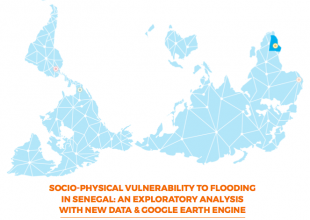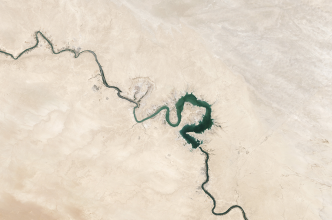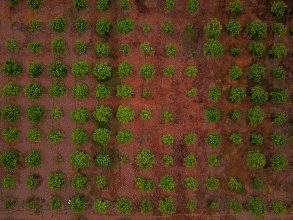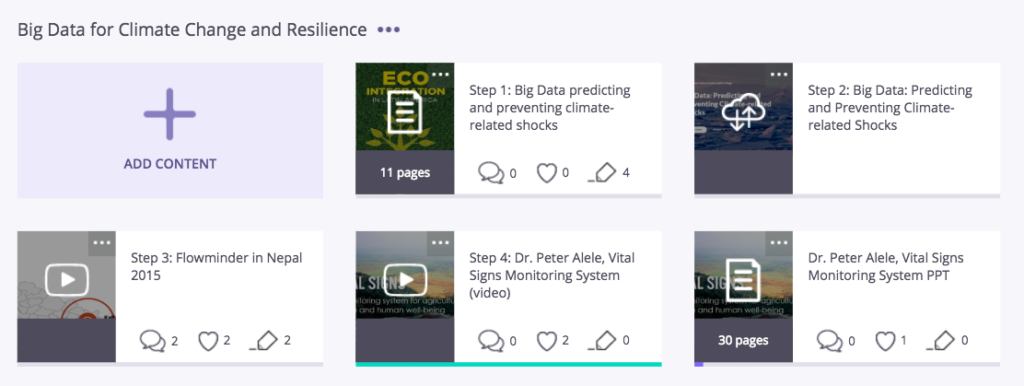Sustainable Futures
About
Market-based policies and economies have helped hundreds of millions of humans escape poverty over the past decades. However, the current trends and patterns of consumption, exploitation of natural and human resources, and concentration of power and wealth in the hands of a few are clearly not sustainable. Our research in this area seeks to understand how to best leverage the positive transformational effect of digital data and technology to shape more inclusive and sustainable human systems.
Publications

“Big Data – Predicting and preventing
climate-related shocks”
Emmanuel Letouzé, David Sangokoya, Julie Ricard
Big Data as a socio-technological phenomenon has the potential to generate new insights on the functioning and interaction of human and natural ecosystems. In particular, Big Data can improve our understanding of how societies deal with shocks related to climate change, and inform policies and actions to foster adaptive mechanisms. However, such positive effects will not occur automatically and investments to address the technological, human, and ethical barriers of Big Data will be necessary. This article analyzes these factors and makes a series of recommendations on the potential for leveraging Big Data for climate change resilience in LAC, impediments in doing so, and requirements if this is to be effective.

"Socio-Physical Vulnerability to
Flooding in Senegal"
Bessie Schwartz, Beth Tellman, Jonathan Sullivan, Catherine Kuhn, Richa Mahtta, Bhartendu Pandey, Laura Hammett, Gabriel Pestre
Each year thousands of people and millions of dollars in assets are affected by flooding in Senegal; over the next decade, the frequency of such extreme events is expected to increase. However, no publicly available digital flood maps, except for a few aerial photos or post – disaster assessments from UNOSAT, could be found for the country. This report tested an experimental method for assessing the socio – physical vulnerability y of Senegal using high capacity remote sensing, machine learning, new social science, and community engagement.

"Big Data for Climate Change Resilience"
Emmanuel Letouzé, Patrick Vinck, Bessie Schwarz, Simone Sala, David Sangokoya, Elizabeth TellmanData-Pop Alliance has been conducting ongoing research on Big Data, climate change and environmental resilience. Our co-Director Patrick Vinck serves as lead author with contributions from several members of CIESIN, as well as our Research Affiliates Simone Sala, Bessie Schwarz and Beth Tellman. The paper outlines the Data–Pop Alliance’s ongoing research on Big Data, climate change, and environmental resilience. Authors dive deeply into the conceptualization of climate change resilience, both specific and general; addresses Big Data contributions to understanding the components of climate risk; and identifies gaps and challenges to Big Data applications to climate resilience decision-making. Finally, suggestions are made for individual and community engagement in building resilience.

“Big Data for Climate Change and Disaster Resilience: Realising the Benefits for Developing Countries”
Jesse Anttila-Hughes and Marc Levy as lead co-authors and Marion Dumas, Lindsey Jones, Gabriel Pestre, Yue Qiu, Emmanuel Letouzé, Simone Sala, Bessie Schwarz, Natalie Shoup, Elizabeth Tellman, and Patrick VinckData–Pop Alliance has been conducting ongoing research on Big Data, climate change and environmental resilience. We published a synthesis report that will feed into the World Humanitarian Summit to be organized in Istanbul in May 2016. Its co-lead authors are Marc Levy from the Earth Institute’s Center for International Earth Science Information Network (CIESIN) at Columbia University, and Data–Pop Alliance’s Research Affiliate Jesse Anttila-Hughes, Professor at the University of San Francisco, with contributions from many of our Research Affiliates and team members. This paper evaluates the opportunities, challenges and required steps for leveraging the new ecosystem of Big Data to monitor and detect hazards, mitigate their effects, and assist in relief efforts as poor communities become more vulnerable to natural hazards. There have been increasing calls to make disaster risk reduction a core development concern and to build resilience so that vulnerable communities and countries as complex human ecosystems not only ‘bounce back,’ but also learn to adapt to maintain equilibrium in the face of natural hazards.
Projects
Open Learning Hub:
Climate Change and Resilience Module
Big Data as a socio-technological phenomenon has the potential to generate new insights on the functioning and interaction of human and natural ecosystems. In particular, Big Data can improve our understanding of how societies deal with shocks related to climate change, and inform policies and actions to foster adaptive mechanisms. However, such positive effects will not occur automatically and investments to address the technological, human and ethical barriers of Big Data will be necessary. This article analyzes these factors and makes a series of recommendations on the potential for leveraging Big Data for climate resilience in LAC, impediments in doing so and requirements if this is to be effective.
Learn more about Climate Change and Resilience on our Open Learning Hub.

